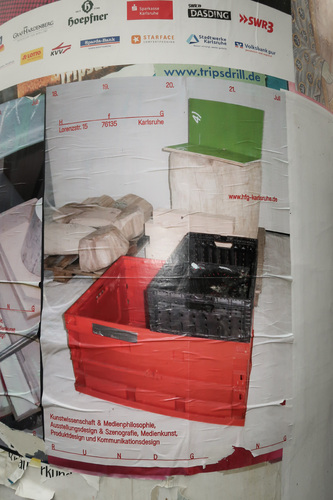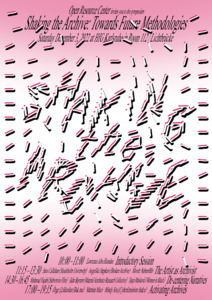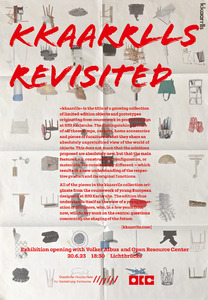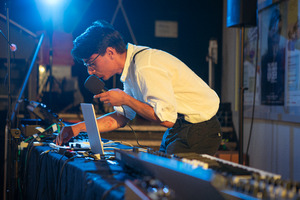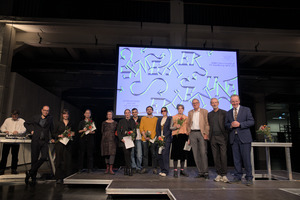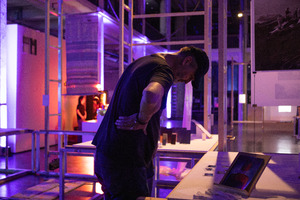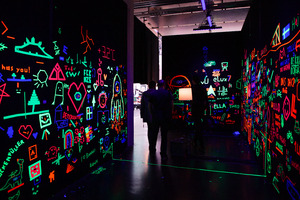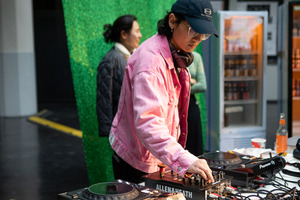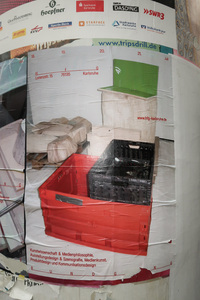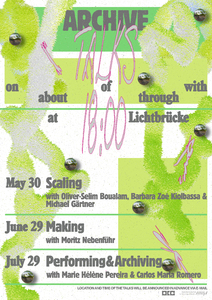Veranstaltungen
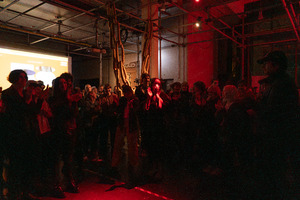
Veranstaltungen
| Titel |
|
| Titel (en) |
|
| Beschreibung (de) |
|
Hervorgehobene Inhalte
15 Inhalte
- Seite 1 von 2
Shaking the Archive
- Titel
- Shaking the Archive
- Titel (en)
- Shaking the Archive
- Autor/in
- Beschreibung (de)
- “…however we define archives, they have no meaning outside the subjective experience of those individuals who, at a given moment, come to use them…” / “On the one hand, there is no state without archives - without its archives. On the other hand, the very existence of the archive constitutes a constant threat to the state.”
Achille Mbembe, The Power of the Archive and its Limits
Weltweit entstehen immer mehr „marginale“, „laterale" oder nicht-institutionelle, selbstinitiierte, informelle und kleine private Archive, die von der Politik öffentlicher Institutionen hinterlassene Lücken schließen und marginalisierten Personen und Realitäten eine Stimme geben. Dabei handelt es sich oft nicht um Archive im eigentlichen Sinne, sondern um Indizes oder kreative Projekte, die mit Materialien und Daten auf neuartige Weise umgehen. Parallel dazu und in Verbindung damit ist eine große Anzahl von forschungsbasierten kreativen Praktiken entstanden, die mit der Aneignung und Neuformulierung archivarischer Methoden arbeiten und damit auf eine Medienrealität im beschleunigten Wandel reagieren. Das Internet und die neuen Medien fordern dazu heraus, neue Sprachen und Methoden des Archivierens zu entwickeln, aber auch eine politisch-strategische, interdisziplinäre Debatte darüber zu führen, was es wirklich bedeutet, Archivmaterial zu teilen beziehungsweise zu kommerzialisieren. Die oben genannten Phänomene: subalterne Archive, forschungsbasierte künstlerische Praktiken und das Aufkommen neuer Medien erschüttern das Archiv – sowohl Inhalt als auch formal – auf unterschiedliche Weise. Gerade der Blick auf kleine und marginale Archivierungsinitiativen lässt uns die heutigen Herausforderungen im Feld der Archive verstehen: das kontinuierliche Aufzeichnen von Ereignissen, das dynamische und autonome Verwalten von Daten, das Dokumentieren und Bewahren möglichst aller Stimmen.
Das Thema des 30-jährigen Jubiläums der HfG Karlsruhe ist "The future of“. Die Zukunft können wir nicht gestalten, ohne uns den gegenwärtigen Fragen der Archivierung des Vergangenen zu stellen. Um unsere Sicht auf die Realität, auf konventionelle westliche Formen des Wissens, der Klassifizierung und der Bewertung in Frage zu stellen, um die jüngste Vergangenheit und ihre materiellen und „immateriellen“ Veränderungen zu dokumentieren, um die vielfältigen und miteinander verknüpften Dringlichkeiten der Gegenwart anzugehen, brauchen wir sowohl das Archiv als auch seine Erschütterungen. Anstatt den Begriff des Fortschritts in Bezug auf die Zukunft allgemein und insbesondere auf die Zukunft des Archivierens zu verwenden, möchten wir die Dimension der Zukunft unter dem Aspekt des Potenzials untersuchen.
Gastredner*innen sind u. a. der Künstler Lawrence Abu Hamdan, die Begründerin des Cyberfeminism Index Mindy Seu, die Direktorin der Villa Romana in Florenz Angelika Stepken und die Wissenschaftlerin Özge Çelikaslan.
- “…however we define archives, they have no meaning outside the subjective experience of those individuals who, at a given moment, come to use them…” / “On the one hand, there is no state without archives - without its archives. On the other hand, the very existence of the archive constitutes a constant threat to the state.”
- Beschreibung (en)
- “…however we define archives, they have no meaning outside the subjective experience of those individuals who, at a given moment, come to use them…” / “On the one hand, there is no state without archives - without its archives. On the other hand, the very existence of the archive constitutes a constant threat to the state.”
Achille Mbembe, The Power of the Archive and its Limits
'Marginal/Lateral’ or non-institutional, self-initiated, informal and small private archives are cropping up across the globe to address gaps and offer a voice to marginalized bodies and realities. These are often not archives in the strict sense of the word, but come in the form of indexes or creative projects that reframe materials and data. Both in parallel and in conjunction, an unprecedented number of research based creative practices, which use appropriation and re-framing (by drawing from the archive or building it) as the basis for their work, and to make sense of a rapidly changing mediatic reality, have also emerged. The added context of the internet and the birth of new media have created the urgency to create a new language and method of archiving, as well for an ethical debate, across different disciplines, around what it really means to share (and often commodify) archival materials. The above fields of enquiry: subaltern archives, research based artistic practices and the emergence of new media are all shaking the archive—both in terms of content and container—in different ways. In order to re-shape our ways of keeping a dynamic record, of sorting and storing data, of preserving all voices, we cannot ignore small scale archival initiatives and attempts.
The theme of HfG’s 30 year anniversary is “the future of” and a future cannot be consciously built without facing a new set of questions around archiving present and past. In order to upend our learned assumptions about reality, about Western forms of knowledge, classification and value; in order to keep a record of the recent past and its material and immaterial transformations; in order to address the multiple, yet interconnected urgencies of the present, we need both the archive and the question, and neither of these ingredients can ever be static. Rather than adopting a notion of progress in relation to the future in general and the future of archiving more specifically, we would like to explore the idea of the future within the framework of potential.
Guests include artist Lawrence Abu Hamdan, Cyberfeminism Index Founder, Mindy Seu, director of Villa Romana in Florence, Angelika Stepken, researcher, Özge Çelikaslan and more.
- “…however we define archives, they have no meaning outside the subjective experience of those individuals who, at a given moment, come to use them…” / “On the one hand, there is no state without archives - without its archives. On the other hand, the very existence of the archive constitutes a constant threat to the state.”
- Typ des Projekts/Werks
- Schlagworte
- Datierung
- 03.12.2022
- Mitwirkende
- Sprache
- Material
- Ort: Institution
- Stadt
- Land
- Bemerkungen
- Titel
- Shaking the Archive
- Semester
- Importiert am
- 01.03.2023
- Übergeordnete Sets
- 1
- Set enthält
- 0 1
kkaarrlls revisited
- Titel
- kkaarrlls revisited
- Autor/in
- Beschreibung (de)
- Das HfG OPEN RESOURCE CENTER lädt Sie herzlich ein zur Eröffnung der Ausstellung kkaarrlls Revisited
Dienstag
20. Juni
18:30
Lichtbrücke
Volker Albus, einer der dienstältesten Professoren des Fachbereichs Produktdesign und ehemaliger Prorektor der HfG, eröffnet die Ausstellung ausgewählter Objekte der Designmarke kkaarrlls, die von HfG-Studierenden entworfen und entwickelt wurden.
kkaarrlls ist ein Projekt, das innerhalb des Fachbereichs PD initiiert wurde und sich zu einer hauseigenen Marke der HFG Design entwickelt hat. Sie repräsentiert eine erlesene Auswahl an Arbeiten von PD-Studierenden aus dem Zeitraum von 2009 bis 2017.
kkaarrlls wurde regelmäßig auf dem Salone Internazionale del Mobile in Mailand präsentiert und hat internationale Aufmerksamkeit in Zeitungen wie Le Monde oder New York Times erlangt.
- Das HfG OPEN RESOURCE CENTER lädt Sie herzlich ein zur Eröffnung der Ausstellung kkaarrlls Revisited
- Beschreibung (en)
- The HfG OPEN RESOURCE CENTER cordially invites you to the opening of the kkaarrlls Revisited exhibition
Tuesday
20th of June
18:30
Lichtbrücke
Volker Albus, one of the longest serving professors of the Product Design department and former HfG prorektor, will open the exhibition of selected items of the kkaarrlls design brand, created and developed by HfG students.
kkaarrlls is a project initiated inside the PD department and has evolved into an in-house brand of HFG design, representing a distinguished selection of PD student's works from the period of 2009 to 2017.
kkaarrlls has been perdiodically presented at the salone internazionale del mobile in Milan and has gained international attention in newspapers like Le Monde or New York Times.
- The HfG OPEN RESOURCE CENTER cordially invites you to the opening of the kkaarrlls Revisited exhibition
- Typ des Projekts/Werks
- Schlagworte
- Datierung
- 20.06.2023
- Ort: Institution
- Ort
- Lichthof 3
- Stadt
- Land
- Internetlinks
- Titel
- kkaarrlls revisited
- Importiert am
- 26.07.2023
- Übergeordnete Sets
- 1
- Set enthält
- 0 5
